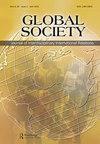通过预期规范进行管理:裁军研究所如何构建自主武器系统知识
IF 2.3
Q2 INTERNATIONAL RELATIONS
引用次数: 0
摘要
规范变革的必要性很少是不言而喻的,但需要行动者的持续努力来创造行动需求。随着自主武器系统(AWS)等新兴技术的出现,考虑到这些系统的早期开发和使用阶段,挑战甚至更大。这就对行为者提出了不同寻常的要求,要求他们就问题的性质、规模和严重性提出证据。这篇文章提出了一种实践-理论的方法来阐明国际组织如何应对围绕AWS的不确定性,这表明人们对规范建设的认识基础知之甚少。关键的主张是,预期规范的出现依赖于前瞻性的认知实践,这些实践产生了关于未来治理对象的知识,并创造了对预防性行动的需求。在分析联合国裁军研究所(裁军研究所)的作用时,我认为,试图将这个问题去科幻化,而不是未来主义的设想,可能是推动预期规范出现的不可或缺的因素。本文章由计算机程序翻译,如有差异,请以英文原文为准。
Governing through Anticipatory Norms: How UNIDIR Constructs Knowledge about Autonomous Weapons Systems
ABSTRACT The need for normative change is rarely self-evident but requires the sustained efforts of actors to create a demand for action. With emerging technologies such as autonomous weapons systems (AWS), the challenge is even greater given the early stages of development and use of these systems. This places unusual demands on actors to present evidence for the nature, scale and severity of a problem. Suggesting that the epistemic bases of norm-building are poorly understood, the article introduces a practice-theoretical approach to cast light on how international organisations cope with the uncertainty surrounding AWS. The key claim is that the emergence of anticipatory norms depends upon forward-looking epistemic practices that produce knowledge about future governance objects and create a demand for preventive action. Analysing the role of the United Nations Institute for Disarmament Research (UNIDIR), I argue that attempts to de-science-fictionalise the issue rather than futuristic scenarios may proof integral to propel the emergence of anticipatory norms.
求助全文
通过发布文献求助,成功后即可免费获取论文全文。
去求助
来源期刊

Global Society
INTERNATIONAL RELATIONS-
CiteScore
3.10
自引率
6.20%
发文量
32
期刊介绍:
Global Society covers the new agenda in global and international relations and encourages innovative approaches to the study of global and international issues from a range of disciplines. It promotes the analysis of transactions at multiple levels, and in particular, the way in which these transactions blur the distinction between the sub-national, national, transnational, international and global levels. An ever integrating global society raises a number of issues for global and international relations which do not fit comfortably within established "Paradigms" Among these are the international and global consequences of nationalism and struggles for identity, migration, racism, religious fundamentalism, terrorism and criminal activities.
 求助内容:
求助内容: 应助结果提醒方式:
应助结果提醒方式:


